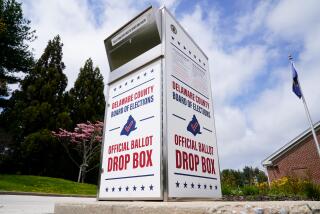Democratic Party Considers Anti-Bush Ad Salvo
- Share via
Democratic Party leaders are mulling a television advertising blitz against George W. Bush in coming weeks, prompting Republicans to warn that Vice President Al Gore would violate his own promise if Democrats are the first to broadcast commercials financed with controversial “soft money” contributions.
In an e-mail sent to Texas Gov. Bush on March 14, Gore said he asked the Democratic National Committee not to use the unregulated “soft money” donations to buy ads unless Republicans or other Bush supporters do so first.
“It’s up to you and your party whether you want to start the ad war arms race,” Gore wrote. “If you are willing to do the right thing, we can change politics forever.”
Gore might have seen it as a wise move at the time, since Bush was struggling to find his footing after a bruising primary season in which voters were drawn to the campaign finance reform message of his rival, Sen. John McCain (R-Ariz.). Now it is Gore who’s slipping behind in national polls, and some Democrats are itching to get on the air.
Democratic Party leaders now say they are free to start their ad blitz without running afoul of Gore’s pledge because the pact was broken when a pair of independent groups aired anti-Gore ads and the GOP briefly broadcast a commercial last month aimed at Latino voters in Fresno.
Republican Party officials say the Fresno ad was not financed with soft-money donations. They also sent an open letter to the Democrats on Wednesday warning them not to air the new ads and then “sell the public and the press on the fiction that you are responding to anything the [RNC] has done.”
Gore campaign officials downplayed the contretemps Wednesday. Gore spokesman Chris Lehane said: “The issue is pretty much moot. You can’t suddenly claim you want a deal after you’ve violated what the terms of that deal would be.”
Media consultants for both parties were scratching their heads over how to manage their soft-money-funded advertising this year, owing partly to wariness of the legal firestorm that rained on them in the last presidential election cycle.
Federal law prohibits the parties from spending soft money on ads that specifically advocate for or against an individual candidate, but it allows for ads promoting the candidates’ positions on issues. Soft-money donations are unlimited contributions that are intended for party promotion or get-out-the-vote activities.
In 1998, federal auditors said both President Clinton and Republican nominee Bob Dole should pay multimillion-dollar fines for orchestrating their parties’ ad campaigns, which amounted to illegal coordination between campaign and party. But the Federal Election Commission rejected the auditors’ recommendation.
In this year’s campaign, the candidates and the parties say they are wary of election law violations in their advertising strategies despite the fact that they are sharing the same media consultants.
Two Democratic Party consultants, Bill Knapp and Bob Shrum, are also working for the Gore campaign. Republican ad maker Alex Castellanos is coordinating both the creation and ad placement for the GOP, while his firm National Media is buying TV time for Bush.
Both parties say there is nothing improper about the arrangements.
Because the pool of top-notch consultants is limited, Democratic Party Chairman Joe Andrew said, “it would literally be impossible for there not to be some overlap.”
Pressure on the parties to start their advertising is rising. Candidates traditionally count on their parties to do their dirty work--airing the harshest attacks on their opponents while they try to appear above negative campaigning.
In 1998, for example, only 20% of TV ads paid for by congressional candidates attacked their opponent, compared with 60% of ads aired by political parties, according to a New York University study released Wednesday.
If the Democrats do hit the air first, analysts say, the damage to Gore would be minimal.
The vice president “may face a little embarrassment, but I don’t think he will face any practical impact,” said Fred Wertheimer, president of the campaign finance reform advocacy group Democracy 21, which supports banning soft money. But, he noted, “if Gore didn’t want to live by that statement, he shouldn’t have made it.”
More to Read
Get the L.A. Times Politics newsletter
Deeply reported insights into legislation, politics and policy from Sacramento, Washington and beyond. In your inbox twice per week.
You may occasionally receive promotional content from the Los Angeles Times.










